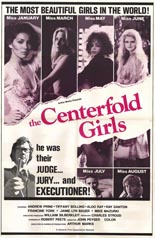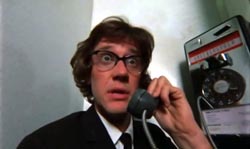
 From Four Rode Out director John Peyser, The Centerfold Girls depicts what happens when a holier-than-thou man with a dubious grasp on reality gets a hold of a straight razor and the special, year-end issue of the fictitious Bachelor skin mag. Played by Andrew Prine (Simon, King of the Witches), Clement Dunne fancies himself a moral guardian who rings up these nude fantasy ladies, threatens to make them pay for their sins of the flesh, works toward and achieves that lofty goal, and then moves on to the next one. Making that premise unique is its three-in-one structure that hoists each story to stand on its own. If not for the running thread/threat of Dunne, it could be an anthology film; with each segment running roughly half an hour, it plays like Sex Pervert Stalker: The Series. That’s a compliment.
From Four Rode Out director John Peyser, The Centerfold Girls depicts what happens when a holier-than-thou man with a dubious grasp on reality gets a hold of a straight razor and the special, year-end issue of the fictitious Bachelor skin mag. Played by Andrew Prine (Simon, King of the Witches), Clement Dunne fancies himself a moral guardian who rings up these nude fantasy ladies, threatens to make them pay for their sins of the flesh, works toward and achieves that lofty goal, and then moves on to the next one. Making that premise unique is its three-in-one structure that hoists each story to stand on its own. If not for the running thread/threat of Dunne, it could be an anthology film; with each segment running roughly half an hour, it plays like Sex Pervert Stalker: The Series. That’s a compliment.
After disposing the corpse of Miss January in the opening credits, Dunne puts away his trademark souvenir (one of the victim’s shoes) from the felonious act and begins targeting Miss March (Jaime Lyn Bauer, Mysterious Island of Beautiful Women). She’s a nurse en route to a job interview when an act of Good Samaritanism backfires in the form of rape-happy hippies who may beat Dunne to the punch (so to speak).
 Next up is Miss May (Jennifer Ashley, The Pom Pom Girls), a model on an overnight shoot on a private island, not unlike the setting for Agatha Christie’s classic And Then There Were None — especially since Dunne has to slay a few extra bodies to get to his intended one.
Next up is Miss May (Jennifer Ashley, The Pom Pom Girls), a model on an overnight shoot on a private island, not unlike the setting for Agatha Christie’s classic And Then There Were None — especially since Dunne has to slay a few extra bodies to get to his intended one.
Finally, Miss July (Tiffany Bolling, Kingdom of the Spiders) is a flight attendant whose grounded exploits accidentally answer the immortal question of what to do with a drunken sailor — two of ’em, in fact. When she eventually crosses paths with Dunne, she’s been through so much that our killer just might find the proverbial table turned.
The law of diminishing returns applies to The Centerfold Girls’ troika of tales, but its one-of-a-kind architecture makes it unlike any suspense slasher you’ve seen. Peyser throws as much female nudity at the camera as he does buckets of bright-red blood, thus satisfying the baseline requirements of 1970s sleaze. Even though he didn’t have to, Prine raises that bar with an actual performance as the omnipotent (and possibly impotent) murderer who has the ability to appear at the perfect place at the perfect time; after a short while, you’ll stop wondering of whom he reminds you. (The answer is Ben Folds.) —Rod Lott
